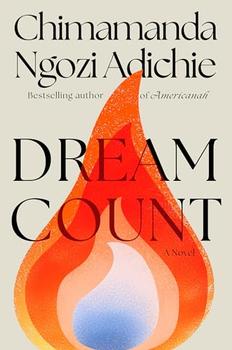Page 1 of 1
There are currently 2 reader reviews for Dream Count
Write your own review!
JanineS
What dreams are made of
I was given an advance reader's copy of this book for an upcoming book club discussion. I was excited and honored to get it because Purple Hibiscus, Adichie's earlier book, is one of my favorites and I think this, the second book I've read by her, will be joining that list.
First, the book is definitely a character-driven novel, though with four female characters (Chiamaka, Zikora, Kadiatou, and Omelgor) whose lives intertwine and with whom you become intimately involved and develop a connection. The four women comes from different backgrounds in their native Nigeria: Chiamaka and Zikora come from wealth and
…more while Omelgor might be more middle class, she cleverly abuses the system to gain wealth; Kadiatou is poor but manages through a series of circumstances to find her way to America where she succeed in creating a good life and finds herself in a friendship with Chiamaka.
Second, a part of the story line is based on real event (the author's note explains this in great detail), so there is an historical element to the telling of these women's lives. This event is fraught with misogyny, sexism and degradation, pointing to dilemmas women, regardless of nationality and country, face every day. Finally, the title itself is about all the women's "dreams" about finding a man who will be "the one" to complete her but in all four stories, "no one" emerges, but these women seem fulfilled in their lives as their stories are told and unfold in the book.
The book is divided into five parts: the first four revolve around each of the characters; the last goes back to Chiamaka, who is the main character, as her friendships and familial relationships are what tie all four women together. In dividing the book this way, Adichie develops her characters, intertwines the women together and shows how as each possibly pursues finding a husband (this is very big in the Nigerian culture, so relatives are always nagging at the women about this), the men they meet either are self-serving, selfish or have secondary motives in pursuing a relationship. When Kadiatou does marry (she really doesn't have the option to be independent), it is an arranged marriage to an older man and it's not all that great. Omelgor writes a column or blog filled with letters advising men on their foibles and why they drive women aways - some of very funny and clever.
All in all, the dream aspect in the novel serves as a great counterpoint to what happens to Kadiatou (you have to read the book to find out what this is), showing that men can be inherently cruel, selfish and that society in general really doesn't have all that high of opinion on women. I really enjoyed this book both for the story line, the female characters who are all so different but who represent real women and their struggles to fit into society, and for the writing itself. Adichie is a wonderful writer. Highly recommend. (less) Jill
Complex and Layered Stories
Jill
Complex and Layered Stories
Dream Count by Chimamanda Ngozi Adichie
The readings by Chimamanda Ngozi Adichie, Sandra Okuboyejo, A’rese Emokpae, and Janina Edwards, are all very well done. I paired the audiobook with the book.
Is true happiness ever attainable or is it just a fleeting state?
Set in Nigeria and America, Dream Count is centered around four women depicting the complexity of each of their lives: Chiamaka, Zikora, Kadiatou, and Omelogor, each reflecting of becoming the best versions of themselves. Chiamaka, a travel writer yearning for a soulmate; Zikora, an ambitious lawyer wanting a career, and the so called, “perfect” family;
…more Kadiatou, a maid seeking opportunities in America; and Omelogor, a financial powerhouse in Nigeria who begins to question how well she knows herself.
Themes of love, motherhood, identity, privilege, longing, regret, and the search for connection are explored in this complex and layered story. A distinctly feminist note rings throughout the book. The atmosphere of pre-lockdown uncertainty of 2020 pandemic is only a backdrop for the reminiscing of the characters. This is my first read of Adichie’s and I really enjoyed it, but felt it was a tad too long. The gender strictures put upon them is the culture of what is expected of Nigerian women. The universal yearning to be known and loved ties each of these women together. I found the character of Kadiatou to be the centerpiece of this book. Adichie, is a gifted storyteller and her writing is beautiful and poetic. I will be reading more from this skilled author.
Thank you to BookBrowse and Penguin Random House for the book to read and discuss. (less)
